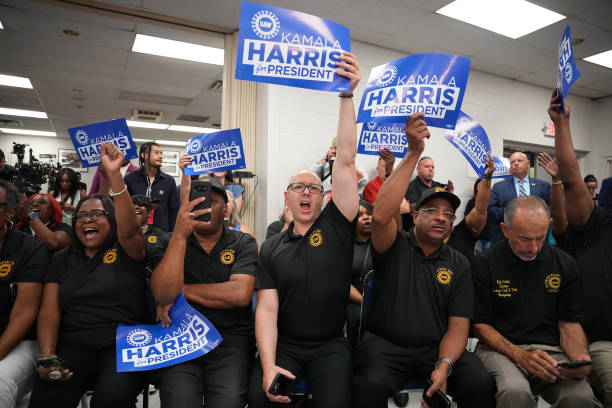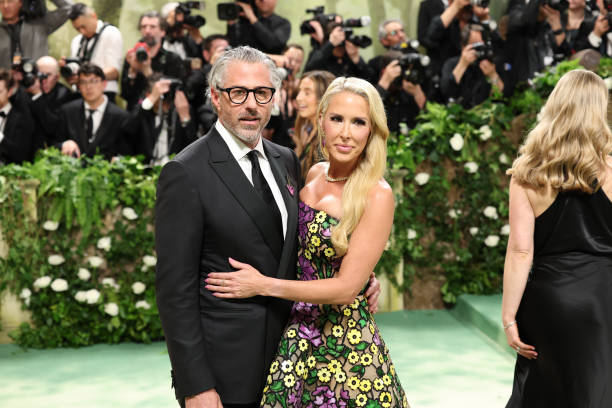PARK TOWNSHIP, Michigan. — For the past two years, American politics, marked by division and ideology, had deeply influenced the once routine work of county government in Ottawa County, where Jim Barry lived. On primary day, voters in this growing, middle-class community of about 300,000 people on Lake Michigan’s shores were heading to the polls.

Jim Barry, who identified as a moderate in the tradition of former President Gerald Ford, was running for a seat on the 11-member county board. He hoped that voters in Ottawa County, which former President Donald Trump won by 21 percentage points in 2020, might be ready for a different political approach.
“I’m not sure Ronald Reagan could pass some of the conservative purity tests in the modern era,” Barry said, standing on a street corner in a red, white, and blue football jersey with “Elect Jim Barry” written on it. While some drivers honked and gave him a thumbs-up, others scowled. His wife thought she saw his opponent in the traffic.
In 2022, eight hard-line Republicans, fueled by anger over pandemic-era mask mandates, won seats on the county board, defeating more moderate GOP candidates. The new commissioners, promising to “thwart tyranny,” aimed to protect the county from forces they claimed were promoting abortion, sexualizing children, and undermining Christian morals.
Ottawa County became a case study in how local government could be swept up in the same ideological battles and erosion of trust that have plagued national institutions. In a series of stories, The Washington Post chronicled the county’s transformation.

ALSO READ : Sifan Hassan wins gold in Paris women’s marathon
Board meetings, once mundane, now often lasted over five hours as residents voiced their opinions on topics like the Bible, drag-queen story hours, and vaccine safety. The board’s new majority influenced policies with significant real-world impacts, leading to costly litigation.
Two years after their victory, the far-right commissioners ran on a simple slogan reflecting their concerns: “Protect the Kids.”
Barry, a 69-year-old real estate agent, understood why many in the community were upset about mask mandates. However, he believed the county government should focus on local issues like water quality and housing costs, rather than divisive national topics like abortion and sexuality.
“It’s not as exciting as trying to do something about transgender athletes in high school sports,” Barry said. “But there’s no purview for the county board of commissioners in that.”
As Barry prepared for his election night party, he reflected on the vitriol that had consumed the community and wondered if it was possible to move away from such intense division.

Twenty-five miles away, on the opposite side of the county, Rachel Atwood campaigned outside her polling place. She was part of Ottawa Impact, a group of hard-line Republicans aiming to maintain control of the board. Atwood, who got involved in county politics over her opposition to mask mandates, believed threats to her children’s well-being persisted from government and pro-LGBTQ+ liberals.
“What makes me a little different in this race is that my experience is much more geared toward the current culture war,” Atwood said in a local television interview.
Atwood was running against John Teeples, a retired attorney and fiscal conservative who sought to restore kindness to county politics. The night before the primary, Atwood and other Ottawa Impact candidates prayed for their community’s protection.
Atwood’s campaign involved knocking on over 2,000 doors, an experience she described as transformative. She believed she had encountered divine guidance in her interactions with constituents, especially those with autistic children, and promised to fight for better county services.
Despite criticism that Ottawa Impact had brought anger and division into county government, Atwood welcomed the increased public engagement. She remained optimistic as she mingled with supporters at her polling place.
As the evening wore on, candidates and their supporters gathered at election night parties, anxiously awaiting results. Barry waited with his half-brother, Rep. Bill Huizenga, at an upscale waterfront restaurant. A surge in website traffic briefly crashed the county’s results page, reflecting the high stakes of the primary.
At the Ottawa Impact party, Atwood and her friends watched a campaign video celebrating their efforts. However, by 11 p.m., most parties had started to wind down. Barry, who had a comfortable lead over his opponent, Gretchen Cosby, returned home. Later that night, the results confirmed his victory with 63 percent of the vote.
The three Ottawa Impact candidates for countywide office lost to more moderate Republicans by about 20 percentage points each. Joe Moss, Ottawa Impact’s co-founder, retained his seat, but the movement that had controlled eight of the 11 board seats in January 2023 was left with a maximum of just four after the primary.
“Their majority is gone,” said a relieved Jacqui Poehlman, a liberal volunteer who had supported a candidate opposing Ottawa Impact. Despite her candidate’s loss, Poehlman and her friends celebrated late into the night.
The next morning, residents of Ottawa County tried to make sense of the results. Atwood didn’t see her loss as a sign that Republicans were tired of Ottawa Impact’s politics; instead, she blamed Democrats who had crossed over to vote in the Republican primary.
Joe Moss vowed not to moderate his message despite the results, emphasizing that morality was not determined by majority opinion.
Ottawa County Clerk Justin Roebuck, a conservative Republican who had tried to remain neutral in the local party’s conflicts, hosted a “unity” party in Holland. He urged Republicans to come together in November to fight for their shared values, invoking Ronald Reagan as a man of principle.
Barry, wearing a shirt featuring the Statue of Liberty and the Founding Fathers, expressed his hope to work collaboratively with the remaining Ottawa Impact Republicans on the county board.
“Nobody was conquered last night,” Barry said. “We all live here. We’re all neighbors.”
With 148 days until the new board members would be sworn in, Ottawa County prepared for a new era in its politics.



